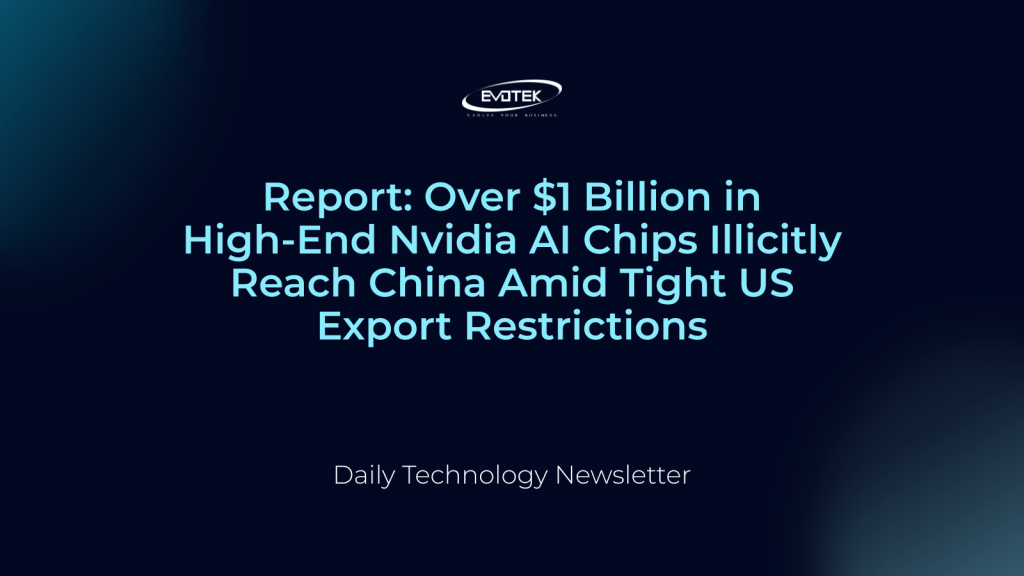An estimated one billion dollars’ worth of advanced Nvidia AI processors have reportedly been smuggled into the Chinese black market, circumventing stringent US government export controls. This staggering figure, neither confirmed nor denied by Nvidia, was brought to light by the Financial Times, which cited interviews, company filings, and sales contracts in its investigation. If accurate, the report underscores the inherent challenges in controlling the global flow of highly coveted AI technology through trade policy.
The specific chips highlighted in the report are Nvidia’s B200 series, part of the cutting-edge Blackwell architecture introduced last year. These units are allegedly being distributed within China’s illicit market as complete, ready-to-install rack systems containing multiple processors, complete with the necessary software for immediate datacenter integration.
These powerful chips are essential to virtually all major US AI powerhouses, including Amazon Web Services (AWS), Microsoft Azure, and Google Cloud. However, the export of such advanced Nvidia chips to China faces severe restrictions under current US trade policy. Despite these prohibitions, the chips appear to be finding their way into the Chinese market via less scrupulous distributors, with rumors pointing to neighboring countries like Malaysia and Thailand as common transit points.
The Persistent Problem of Semiconductor Smuggling in China
The illicit trade of semiconductors is not a new phenomenon for China, where a thriving underground market for Western-designed chips has long existed. China’s domestic chip fabrication capabilities have historically lagged behind its economic rivals, most notably Taiwan, home to manufacturing giant TSMC, which produces the majority of Nvidia’s chips. Periodically, claims of competitive, domestically produced Chinese microprocessors surface, only to reveal products that are often little more than bootlegged versions of older-generation chips from Silicon Valley firms such as Intel or AMD.
In response, US lawmakers have progressively tightened trade regulations on semiconductor technology sales to China, particularly concerning AI chips. Vocal proponents, often referred to as “China hawks” in Congress, view the Asian nation as the primary opponent in an escalating technology-focused trade war.
Adding to this tension are China’s assertions of achieving greater AI research progress with less investment than US firms. For instance, researchers behind DeepSeek, a Chinese large language model (LLM) launched earlier this year, claim it can deliver results comparable to top US AI models with significantly lower investment.
Evolving US Policy and Market Realities
Previously, the Trump administration imposed a universal ban on AI chip exports to China, which meant Nvidia could not sell any AI chips there as of April. Earlier this month, however, the administration reportedly lifted this blanket ban, permitting the sale of comparatively less powerful chips like the H20. This policy adjustment, however, was met with disapproval from certain government sectors.
Despite these policy shifts and tightened regulations, the availability of high-end processors from Nvidia and other suppliers on the Chinese black market shows no signs of abatement. The Financial Times report indicates that the B200 series is not the only Nvidia AI chip accessible through illicit channels; other models, including the H200, H100, and 5090, also appear to be “falling off the truck.”
Implications for Nvidia and the Tech Landscape
This widespread circulation of restricted Nvidia chips in China could draw significant scrutiny from US lawmakers, even if the company is not directly involved in the smuggling operations. Nvidia, which has seen its valuation soar to an unprecedented $4 trillion largely due to its dominance in AI processors, finds itself in a delicate position.
While Nvidia has stopped short of outright denying black market sales, a company spokesperson, in a statement to the Financial Times, dismissed the notion of “cobbled together” datacenters built from “smuggled products.” The spokesperson emphasized, “Datacenters require service and support, which we provide only to authorized Nvidia products.”
Conversely, the Chinese distributors selling these illicit goods often advertise the prebuilt rack-mount processor units as virtually plug-and-play on social media platforms. Some vendors even offer testing services to assure customers of product functionality, despite the hefty price tag—Chinese buyers reportedly pay a 50 percent surcharge over the legitimate market price.
Nvidia’s Taiwan-born co-founder and CEO, Jensen Huang, views China as a substantial market opportunity and a vital source of talent. His perceived negotiations with President Trump are believed by some to have played a role in the administration’s decision to partially lift the blanket ban on Nvidia chip exports.
However, not all US companies share the same bullish outlook on Chinese partnerships. AWS recently closed its AI lab in China, citing staff reductions and other “business decisions.” It remains uncertain whether the ongoing escalation of the US-China trade war directly influenced this move, but the persistently strained relations between the two global powers are unlikely to ease in the near future.

 日本語
日本語 한국어
한국어 Tiếng Việt
Tiếng Việt 简体中文
简体中文